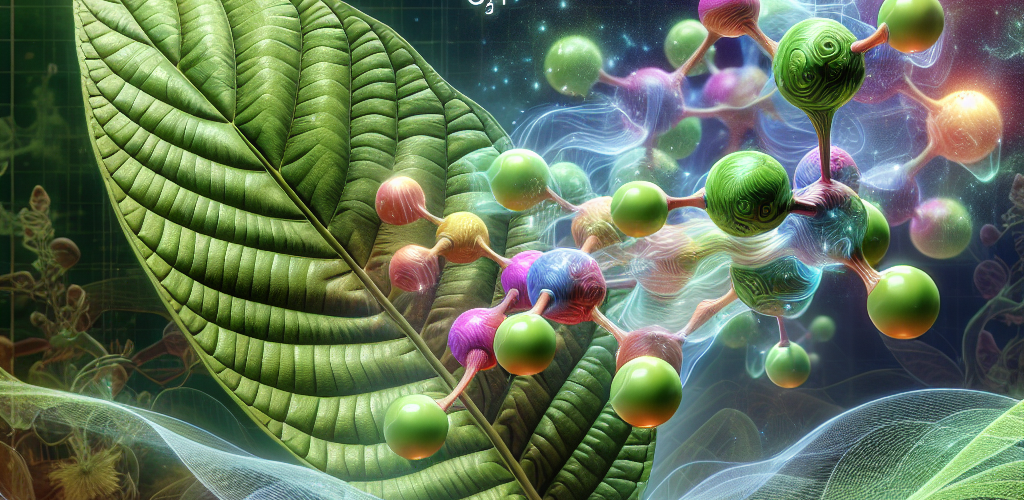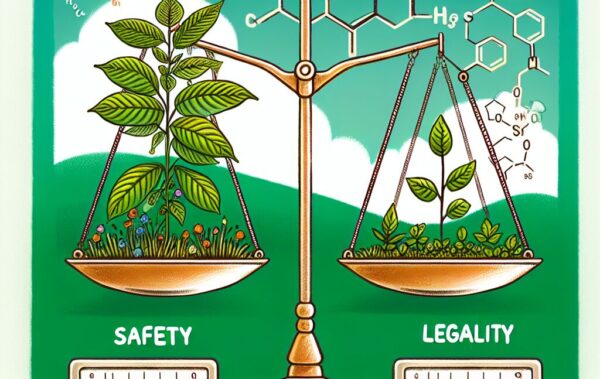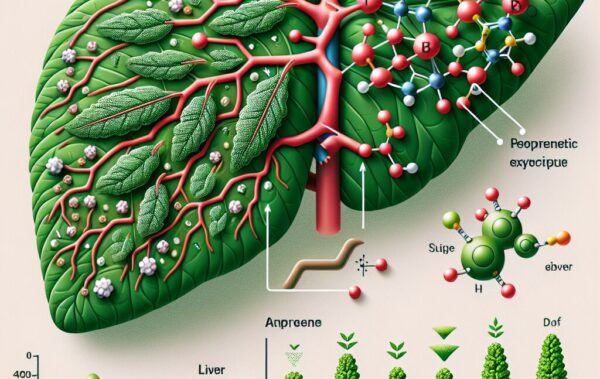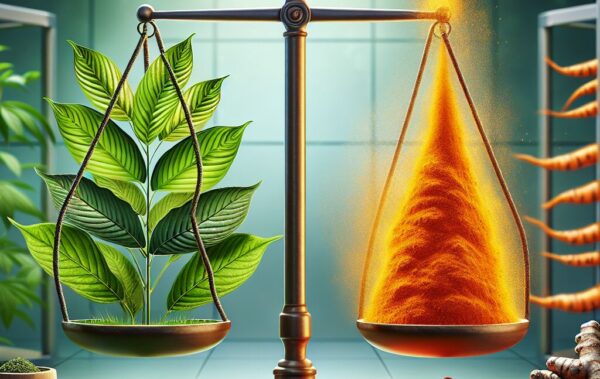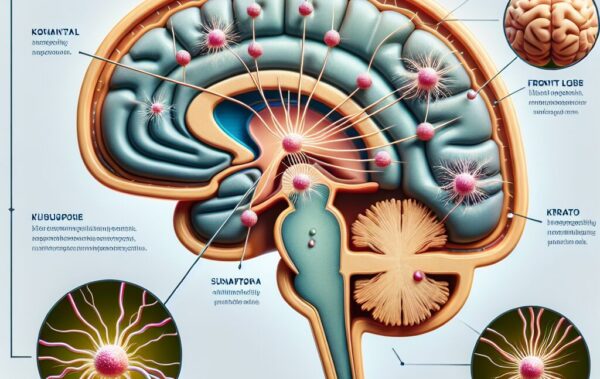- Understanding Kratom and Its Active Compounds
- Serotonin System: Fundamentals and Functions
- Mechanisms of Kratom-Serotonin Interaction
- Effects of Kratom on Mood and Cognition
- Frequently Asked Questions (FAQs) about Kratom and Serotonin
Mitragyna speciosa, commonly known as kratom, is a tropical evergreen tree from the coffee family that has garnered significant attention for its unique set of active compounds. These compounds play a crucial role in how kratom interacts with the human body, particularly with the brain’s neurotransmitter systems. The most notable compounds in kratom leaves are mitragynine and 7-hydroxymitragynine, which are alkaloids that have been shown to have an effect on mood regulation, among other things.
Within the spectrum of kratom products, you’ll find a variety of forms, such as powders, capsules, and even liquid extracts, each possessing a different concentration of these alkaloids. The concentration of these compounds can vary significantly depending on the strain and the geographic location where the kratom was grown. For instance, the Bali and Maeng Da strains are popular for their robust profile of effects, which many users attribute to their specific alkaloid compositions.
The precise mechanism through which kratom’s active compounds affect neurotransmitter systems like serotonin remains a focus of ongoing research. Serotonin, a key neurotransmitter, is critical for mood regulation and is implicated in a range of bodily functions and psychological processes. It’s important to understand that kratom doesn’t just contain mitragynine and 7-hydroxymitragynine; it also contains other alkaloids and phytochemicals, which could potentially contribute to its overall pharmacological effects. This complex combination of substances might explain the different experiences users report and underlines the distinct interplay between kratom and serotonin.
To understand this interplay further, one must consider the nuanced role these compounds play once kratom is consumed. The general consensus is that mitragynine primarily acts on the opioid receptors in the brain, but there is evidence that it may also interact with other receptor systems. However, due to the complexity of mood regulation and the multiple receptors involved in serotonin signaling, the full scope of kratom’s impact on this system is still being deciphered. In addition to serotonin, kratom’s alkaloids could potentially interact with dopamine, adrenergic, and GABAergic systems, all of which contribute to its psychotropic profile.
Consumers interested in exploring the potential mood-regulating benefits of kratom might consider starting with smaller doses of kratom powder or capsules. As with any herbal supplement, it is crucial to understand the source and quality of kratom products. For those new to kratom, visiting a reputable kratom shop or browsing a well-curated online marketplace can provide valuable guidance on selecting products that suit individual preferences and needs. Always begin with a small dose to assess tolerance and response, and consult a healthcare provider before integrating kratom into a wellness regimen, especially if there are existing health conditions or concurrent use of other medications.
Serotonin System: Fundamentals and Functions
Serotonin is a neurotransmitter that is often referred to as the “feel-good hormone” because of its crucial role in mood regulation and its impact on the entire body. It is synthesized from the amino acid tryptophan and is found predominantly in the digestive system, blood platelets, and the central nervous system (CNS). This multifaceted neurotransmitter is implicated in a slew of physiological functions including sleep, appetite, pain sensation, and emotional states.
In fact, serotonin is so important in the brain that a deficit is often associated with various mental health conditions, such as depression and anxiety disorders. This is why certain medications, such as selective serotonin reuptake inhibitors (SSRIs), which are commonly used to treat depression and anxiety, work by increasing the level of serotonin in the brain.
However, serotonin’s functions extend far beyond mood regulation. It is involved in hormone secretion, cardiovascular function, and even plays a role in the gastrointestinal tract by regulating bowel movements and functioning. The intricate ways in which serotonin levels and receptor function can influence both physical and psychological well-being exemplify the importance of maintaining balance within this system.
Consider, for example, the relationship between serotonin and circadian rhythms. Serotonin release is not steady throughout the day; it fluctuates and is part of the reason why we experience changes in mood and energy levels at different times. A well-functioning serotonin system helps regulate this internal clock, allowing for a consistent sleep-wake cycle, which is integral to overall health.
Given the significant functions of the serotonin system in the body, it’s understandable why substances that influence serotonin pathways can have profound effects. Kratom, with its diverse set of alkaloids, highlights the interplay between plant-based compounds and human physiology. Users and researchers alike are intrigued by how kratom might influence serotonin levels and function, and whether it could offer an alternative or addition to the existing treatments aimed at mood regulation and serotonin-related conditions.
The fascination with kratom’s potential impact on the serotonin system is not unfounded. People often turn to kratom for potential relief from a myriad of ailments, looking for both its stimulating and sedative effects. It is this dual nature, depending on the dosage, that further compels the need to understand how kratom might modulate the intricate workings of the serotonin system.
For individuals curious about the effects of kratom and how it might interact with the serotonin system to potentially influence mood regulation, guidance through reputable sources and careful selection of products is integral. Whether seeking kratom capsules, powder, or liquid extracts, understanding the source and quality of the product is essential. Each person’s experience with kratom is unique, and starting with a lower dose to gauge personal reaction is always recommended. As with any substance that may influence neurotransmitter systems, prudent use and consulting with a healthcare professional is advisable.
Mechanisms of Kratom-Serotonin Interaction
Diving deeper into the specifics, the interplay between kratom and serotonin unfolds through a series of bioactive effects induced by kratom’s natural compounds. Research suggests that mitragynine, the predominant alkaloid in kratom, influences the brain’s neurochemistry not just by its action on opioid receptors but potentially by affecting serotonin pathways as well.
It’s postulated that mitragynine’s molecular structure allows it to bind to various types of receptors in the brain, which may include serotonin receptors. When this binding occurs, it could lead to changes in neurotransmitter release and uptake, thereby influencing mood regulation and possibly producing effects reminiscent of both stimulants and sedatives, depending on the dose.
At lower doses, users often report feelings of increased energy, focus, and alertness – effects which may implicate interactions with not only serotonin but also dopamine, a neurotransmitter associated with reward and pleasure. Conversely, at higher doses, kratom tends to exhibit more sedative properties, possibly mirroring the processes that a boost in serotonin can provide, such as feelings of well-being and contentment.
This dualistic nature of kratom based on dosage is vital to consider when discussing its potential therapeutic applications. As individuals explore kratom products, like those found in the powder or capsule forms, they may be inadvertently modulating their serotonin system, which emphasizes the importance of education and responsible use.
Another point of interest involves kratom’s effect on serotonin receptors themselves. Studies indicate kratom may act as a serotonin antagonist, meaning it might bind to these receptors without activating them, blocking or dulling the action of serotonin in certain brain regions. This effect has the potential to influence mood, but the ramifications of regular or long-term kratom use on the serotonin system remain under-explored.
Furthermore, considering that serotonin has a role in numerous physiological functions beyond mood, including digestion, sleep, and pain perception, the impact of kratom on these processes is an area ripe for investigation. Kratom’s alkaloids may hold nuanced effects on gastrointestinal motility or pain pathways, which are heavily intertwined with serotonin signaling.
It’s worth noting that while these hypotheses are grounded in scientific rationale, much of the current knowledge is based on preclinical studies or anecdotal reports, and there’s a clear need for further research. Nonetheless, understanding the potential that kratom has for influencing mood, cognition, and overall well-being through serotonin interaction is an area that undoubtedly captures the attention of both the scientific community and those interested in alternative wellness options.
As research progresses, those curious about the effects of kratom may choose to explore its myriad forms, from tea and liquid extracts to other novel presentations, like edibles or shots. With responsible use in mind, integration into one’s lifestyle should be approached with caution, always starting with low doses and slowly titrating up as needed. And of course, consulting with health professionals before use cannot be overstated, especially for individuals with pre-existing conditions or those taking medications that may interact with kratom’s alkaloids.
Effects of Kratom on Mood and Cognition
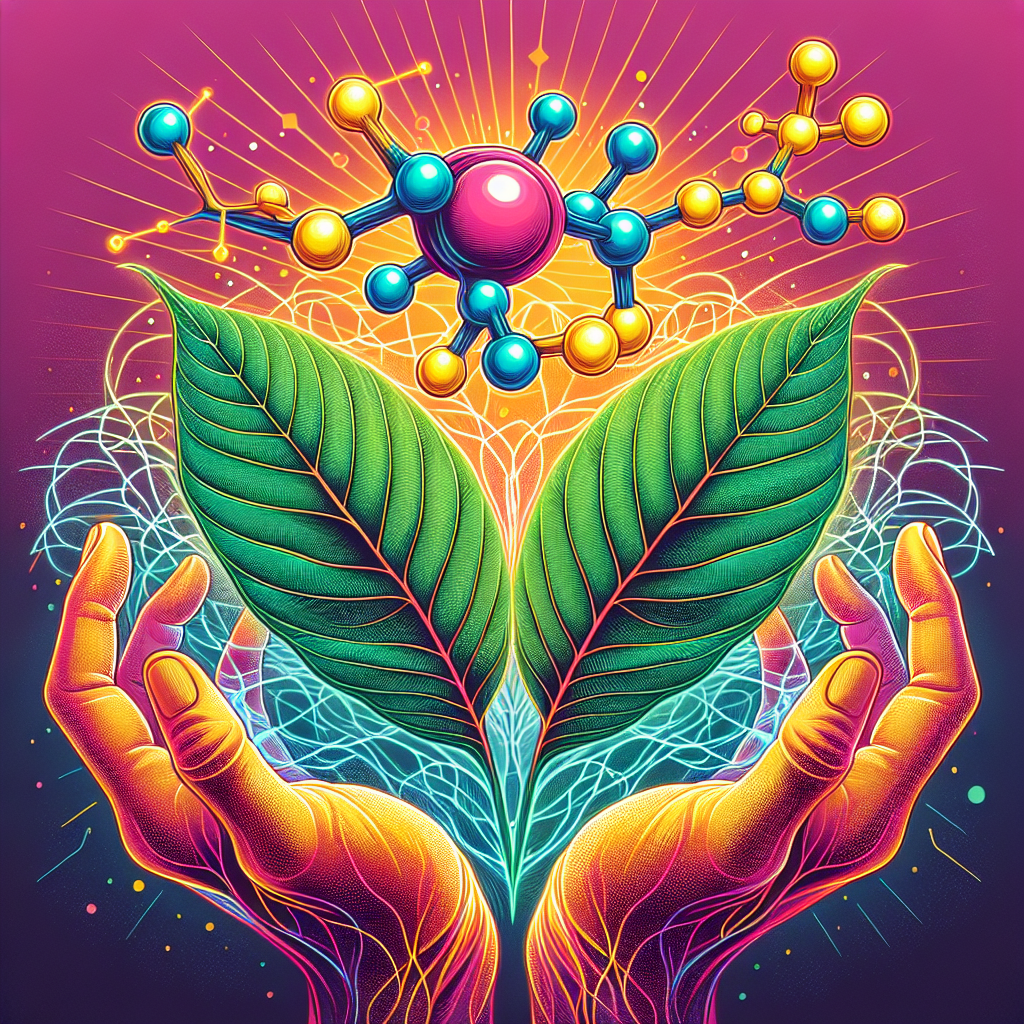 When exploring the relationship between kratom and serotonin, we encounter a fascinating window into how natural substances can influence mood and cognitive functions. The interplay between kratom’s active constituents and serotonin pathways might be a key factor in understanding why users report different emotional and mental effects after consuming kratom. Particularly, the influence of kratom on mood regulation, which is so closely tied to serotonin activity, raises compelling questions about the synergy between these two elements.
When exploring the relationship between kratom and serotonin, we encounter a fascinating window into how natural substances can influence mood and cognitive functions. The interplay between kratom’s active constituents and serotonin pathways might be a key factor in understanding why users report different emotional and mental effects after consuming kratom. Particularly, the influence of kratom on mood regulation, which is so closely tied to serotonin activity, raises compelling questions about the synergy between these two elements.
Mood regulation is a complex process that involves a balance of various neurotransmitters, hormones, and environmental factors. Serotonin, known for its contribution to feelings of well-being and happiness, is central to this balance. The mood-lifting effects of kratom are often one of its most celebrated attributes, leading many individuals to use kratom in the pursuit of emotional wellness. These anecdotal reports suggest that kratom may have an antidepressant or anxiolytic-like effect on mood.
When it comes to cognition, kratom’s users often cite enhanced focus and clarity as one of the plant’s benefits. Cognitive processes are inextricably linked to mood; when we’re feeling down or anxious, our cognitive abilities often decline. Conversely, when our mood is elevated, we may experience sharper thinking and improved concentration. This suggests that kratom’s impact on mood could, indirectly, enhance cognition as well.
It’s worth noting, however, that the effects of kratom are not uniform for everyone. This variability can be attributed to individual differences in brain chemistry, the specific strain of kratom used, and the dosage. Some strains, like the white or green veined varieties, are often recommended for their nootropic effects, while others, such as the red veined kratom, are more closely associated with relaxation and sedation. The precise way in which kratom might influence serotonin levels and receptors is still being unraveled, highlighting the need for further study to understand the potential therapeutic applications and contraindications associated with its use.
As intriguing as the potential mood and cognition benefits of kratom are, it remains paramount to approach the use of kratom with a thorough understanding of one’s health and wellness needs. The breadth of kratom products available, whether in the form of powders, capsules, or other innovative products like shots, gives users the ability to choose options that best meet their desired experience and dosage control.
In conclusion, while much of the current discussion around kratom’s effects on mood and cognition remains speculative or anecdotal, there is a growing body of preclinical evidence supporting the role of kratom’s alkaloids in the modulation of the serotonin system. As research into these mechanisms develops, so too will our understanding of how kratom can be used responsibly and effectively. Users must exercise caution and seek guidance from health professionals when incorporating kratom into their regimen, paying close attention to dosage and potential interactions with other substances.
Frequently Asked Questions (FAQs) about Kratom and Serotonin
Frequently Asked Questions (FAQs) about Kratom and Serotonin
As we delve into the connection between kratom and serotonin, numerous questions arise regarding their interplay and how it can affect mood regulation. Listed below are some of the common queries we encounter:
1. Can kratom affect serotonin levels in the body?
While studies on kratom’s direct impact on serotonin levels are limited, kratom contains alkaloids like mitragynine that may influence serotonin pathways in the brain. This could potentially impact mood regulation and psychological well-being.
2. Is it safe to use kratom for mood regulation?
Kratom’s mood-regulating effects are subjective and vary from person to person. While some users report positive effects, it’s important to recognize that kratom is not regulated by the FDA. Any use of kratom for mood regulation should be approached with caution and preferably under the guidance of a healthcare provider.
3. What are the potential risks of using kratom with regard to serotonin?
Kratom may interact with the serotonin system, which could lead to changes in mood and behavior. There is also the potential for kratom to interfere with medications that impact serotonin levels, such as SSRIs. Users should be wary of the risk of serotonin syndrome, a potentially life-threatening condition, although more research is needed to determine kratom’s role in this.
4. Can combining kratom with other serotonin-affecting substances lead to complications?
Yes, combining kratom with other substances that affect serotonin levels can increase the risk of complications like serotonin syndrome. It’s crucial to consult with a healthcare professional before combining kratom with other drugs or supplements.
5. How can someone use kratom responsibly if they’re interested in its effects on mood?
Responsible kratom use involves starting with a low dose to assess individual response, avoiding combining it with substances that have similar effects on serotonin, and monitoring its impact on mood and cognition. It’s also important to source kratom from reputable vendors and to consult a healthcare provider before use, especially if there are underlying health issues or if other medications are being taken.
6. Are there particular kratom strains that are better for mood regulation?
Strains such as Maeng Da and those with a green or white vein are often cited by users as being more uplifting and may have more pronounced effects on mood. However, individual experiences can vary, and it’s advised to start with small amounts to determine how a specific strain affects you.
7. Where can I find quality kratom products?
Quality kratom products can be found through reputable online kratom shops. Look for vendors that provide detailed information about their sourcing, processing, and lab testing to ensure you’re receiving a pure and potent product.

